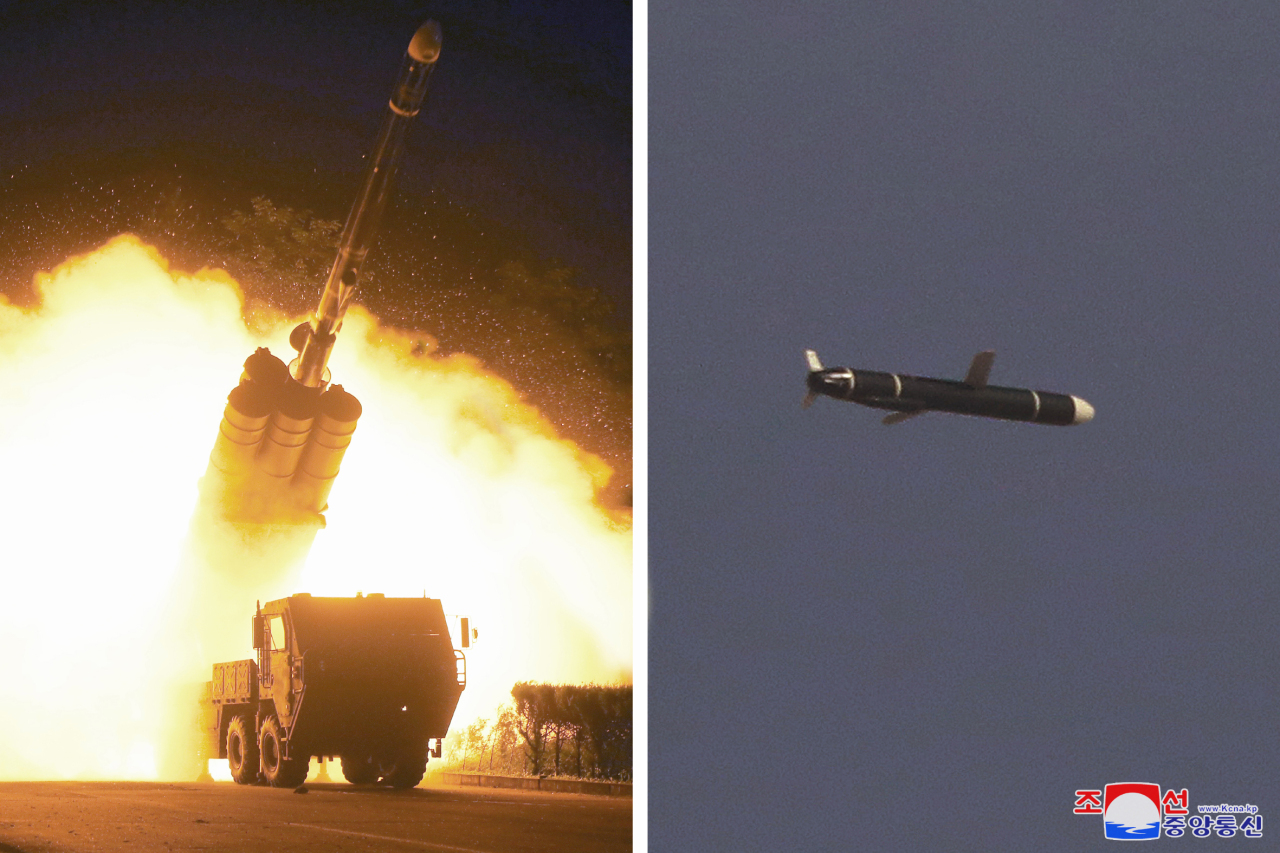North Korea test-fires new long-range cruise missiles
Pyongyang ratchets up tension ahead of Chinese Foreign Minister Wang Yi’s Seoul visit and trilateral talks among South Korea, the US and Japan
By Ahn Sung-miPublished : Sept. 13, 2021 - 15:37

North Korea said Monday that it had successfully test-fired a new type of long-range cruise missile over the weekend, ramping up tensions as South Korea, the US and Japan get ready for a Tuesday meeting to discuss the North’s nuclear issue.
During the tests Saturday and Sunday, the cruise missiles flew in ovals and figure eights for more than two hours above the North’s land and waters before hitting targets 1,500 kilometers away, according to the Korean Central News Agency.
The report called the missile a “strategic weapon of great significance,” stressing that the successful tests gave the country “another effective means of deterrence” against “the military maneuvers of the hostile forces.”
It noted that the missile, which the North had been developing for the past two years, was part of a weapons development goal announced by North Korean leader Kim Jong-un at the eighth party congress in January.
Hailing the results, it added that “detailed tests of missile parts, scores of engine ground thrust tests, various flight tests, control and guidance tests and warhead power tests were conducted with success.”
The regime’s last known major missile tests took place in March, when Pyongyang fired two short-range ballistic missiles in defiance of UN sanctions, drawing strong rebukes from Seoul, Washington and Tokyo. It also conducted a cruise missile test in January, just hours after US President Joe Biden took office.
A UN Security Council resolution prohibits the North from developing or testing any nuclear weapons or ballistic missiles, which are capable of carrying nuclear warheads. But it remains free to develop cruise missiles, as these are considered a lesser threat. The KCNA indicated that the North’s Kim had not attended the weekend tests, despite having participated in all major weapons tests in recent years.
For these reasons, observers view the cruise missile tests as a low-key provocation. But Park Won-gon, a professor of North Korean Studies at Ewha Womans University, said they still posed a “serious threat,” adding that the North explicitly describing the missile as a “strategic weapon” suggested possible nuclear capabilities.
“There is a high possibility that the North could master the technology to miniaturize nuclear warheads small enough to be carried on a cruise missile,” said Park. “If this is the case, the cruise missile could pose a serious threat to South Korea and other neighboring countries.”
He said the North’s missile tests were intended as a warning to the US and South Korea in response to the joint military exercises that ended last month. Pyongyang had objected to the exercises, threatening they would cause a “security crisis.”
The latest tests also highlighted progress in Pyongyang’s weapons buildup, according to Cheong Seong-chang, director of the Center for North Korean Studies at the Sejong Institute.
“Leader Kim had said his country will develop new weapons at the party congress in January, and the latest test is to show to his people that the development is underway as he had announced,” said Cheong.
The test launches come ahead of a trilateral session in Tokyo where South Korea, the US and Japan are to discuss how to lure Pyongyang back to the stalled denuclearization talks.
During their last three-way meeting, held in Seoul in June, Sung Kim, US special representative for North Korea, said Washington was willing to meet Pyongyang “anywhere, anytime, without preconditions.” But Pyongyang has so far rebuffed Washington’s diplomatic overtures.
Chinese Foreign Minister Wang Yi is scheduled to visit Seoul on Tuesday for talks with his South Korean counterpart, Chung Eui-yong, during which North Korea is expected to be high on the agenda.
The US Indo-Pacific Command said in a statement Monday that the tests posed threats to the region and beyond, and that it was continuing to monitor the situation.
“This activity highlights DPRK’s continuing focus on developing its military program and the threats that poses to its neighbors and the international community,” the command said, abbreviating the North’s official name, the Democratic People’s Republic of Korea.
South Korea’s Joint Chiefs of Staff said an in-depth analysis was underway in close cooperation with US intelligence authorities, but it declined to confirm details.




















![[Today’s K-pop] BTS pop-up event to come to Seoul](http://res.heraldm.com/phpwas/restmb_idxmake.php?idx=642&simg=/content/image/2024/04/17/20240417050734_0.jpg&u=)